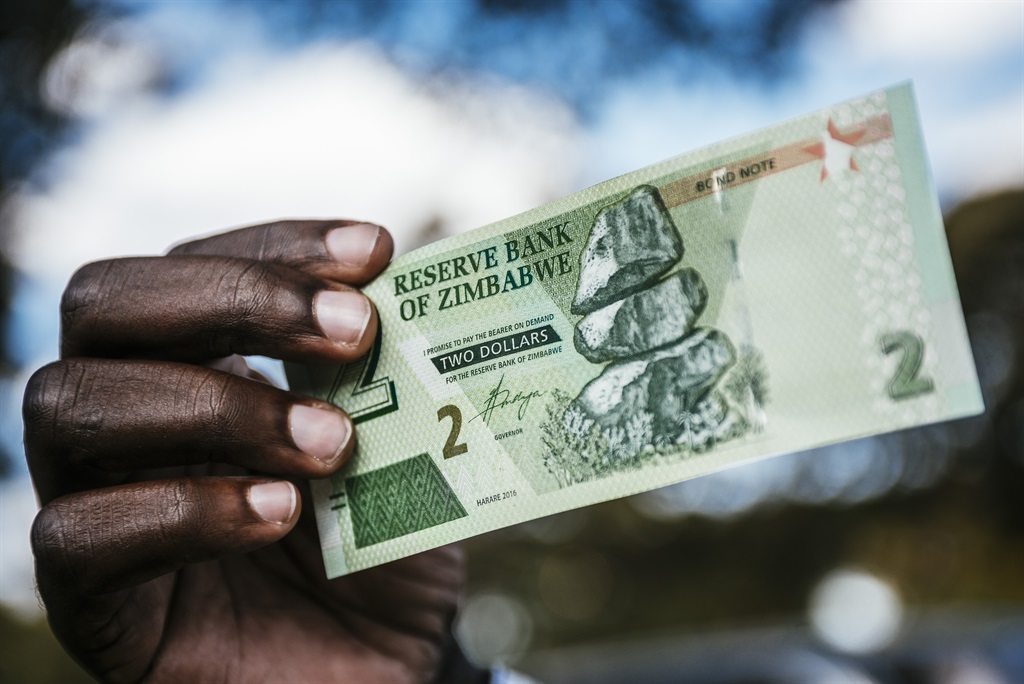
- Trouble began brewing for Old Mutual in Zimbabwe this year when President Emmerson Mnangagwa's advisor Chris Mutsvangwa blamed the financial services giant for causing foreign currency instability in the country.
- Mutsvangwa claimed the company was overriding the powers of the Reserve Bank of Zimbabwe via the Old Mutual Implied Rate (OMIR), which operates on a principle similar to the Big Mac Index.
- Old Mutual Zimbabwe is arguably the biggest financial institution in Zimbabwe, where it has been in operation since 1902.
Old Mutual has become the latest major company to be fingered by Zimbabwe's government as it seeks an explanation for the southern African country's ongoing economic woes.
Like telecommunications giant Econet – which previously drew the ire of Zimbabwean authorities - Old Mutual has been locked in a battle with the ruling Zanu-PF, which claimed the financial services company was moving to externalise capital.
In a series of cryptic statements, Zanu-PF said Old Mutual should be delisted from the ZSE and instead be listed on a stock exchange that does not trade in Zimbabwe dollars - despite the fact that no such exchange yet exists, and that trading has been suspended on the ZSE itself since the end of June.
Last Friday, local media reported that government was set to hold a meeting with Old Mutual to chart a way forward. By Monday, Bloomberg reported that according to insiders, Old Mutual had agreed to agreed to move its listing to a new bourse in the country that will only deal in foreign currency. The deal, according to Bloomberg, came after talks on Monday between representatives of Old Mutual, the Treasury, the Securities and Exchange Commission of Zimbabwe and the ZSE.
Another meeting is reportedly scheduled for next week to nail down the finer details as well as administrative matters.
Brewing tensions
The significance of Old Mutual's footprint in Zimbabwe cannot be overstated. Like Econet, which controls over 90% of transactions in Zimbabwe by volume, Old Mutual controls the majority of pension assets in the country. It also owns the third largest bank and buildings, and its financial roots in the country run deep.
Tensions began simmering earlier in the year, when President Emmerson Mnangagwa's advisor and Zimbabwe National Liberation War Veterans Association chairperson Chris Mutsvangwa blamed the financial services giant for causing foreign currency instability in the country.
Mutsvangwa criticised the insurer for "usurping the powers of the RBZ to determine the country's exchange rate," through the Old Mutual Implied Rate (OMIR), which operates on a principle similar to the Big Mac Index - that is, it is used to calculate the value of a currency in different jurisdictions.
Old Mutual as a company is not involved in the use of its share price to calculate the OMIR, which is calculated and used independently. But in just over a year, the Zimbabwe dollar sank to 1% of its former value against the US dollar, using the OMIR.
By March 2020, Old Mutual found its shares suspended. Finance Minister Mthuli Ncube said the suspension was "part of broad and bold measures to weed out some of the visible sources of currency instability".
Authorities believed investors were willing to pay a premium because fungibility allowed them to on sell the shares on the JSE and take out capital, long trapped in foreign currency-starved Zimbabwe.
But suspending OM's fungibility did not stop the Zimbabwe dollar from further losing value. By June, authorities took more stringent measures. Trading was suspended altogether on the ZSE, with government stating it had " impeccable intelligence" that there was a conspiracy to sabotage the economy through illicit activity. It alleged involvement by mobile money systems.
Soon afterwards, the call came to delist Old Mutual from the ZSE, and instead list it on the not-yet-established exchange.
In Zimbabwe's crosshairs
How did all of this happen? The financial services group has a footprint on two levels in the southern African country: first, through its secondary listing on the ZSE, where fewer than 90 million of its shares are listed. Secondly, as one of its regional operations through subsidiary Old Mutual Zimbabwe.
The listed entity is the one blamed for Zimbabwe's currency upheavals.
There is still confusion over why. While the ruling Zanu-PF issued a statement saying it supported government's decision to "eject" Old Mutual from the country's "financial system", the statement was at odds with government's statement, which only said that trading on the ZSE was suspended - and had not mentioned the group's ejection from the financial system. At the time, the ZSE awaited official word.
Eventually, Zanu-PF spokesperson and former Finance Minister Patrick Chinamasa issued a clarifying statement, in which he accused the company of trying to externalise capital out of Zimbabwe through its fungibility status.
The ruling party said it was "at a loss to understand how the government of the day can run an economy where the fungibility of the shares of one company create money, externalise funds and determine the rate of exchange".
But apart from share buybacks or issuing shares through rights offers, a company - Old Mutual, in this case - is not able to determine its share price. It can also not determine who buys its shares or for what reason. It can also not determine what market participants decipher from its share price.
Old Mutual shares trade in a secondary market, and how trading is conducted is managed by the ZSE and regulated by the Securities and Exchange Commission of Zimbabwe.
Dragged through the mud
Old Mutual has declined to comment, save to say it is seeking clarity from authorities.
While Chinamasa's comments have since been clarified, market watchers are left with a sense of uncertainty over how investments are treated in the country.
The matter also raised questions over the legal and regulatory environment in Zimbabwe.
According to legal resource firm, Veritas Zimbabwe, government’s suspension of all trading on the ZSE was not done in terms of any law and was carried out with little regard for due process and fairness.
Caught in the web
The group's subsidiary, Old Mutual Zimbabwe, has in the meantime also been caught in the crossfire and had to seek clarification on where it stands with the authorities.
Old Mutual Zimbabwe is arguably the biggest financial institution in Zimbabwe, where it has been in operation since 1902. It has captured the largest market share of the life assurance and asset management industries, and controls a significant portion of the market capitalisation of the Zimbabwe Stock Exchange where it is also arguably the biggest fund manager buying into equities.
Its demutualisation and subsequent listing in 1999 was life-changing for more than 165 000 Zimbabwean policyholders who got a minimum of 300 shares each in what was then Old Mutual plc.
A Harare stockbroker who requested anonymity, given the sensitivity of the issue, said Old Mutual Asset Management is the biggest investor on the ZSE and without its orders, as a stockbroker, one would be out of the market.
"They are the biggest asset manager by funds under management and equity holdings and they are fairly active."
Old Mutual also owns the largest building society in the country, Central Africa Building Society (CABS) which opened its doors in 1954.
In the real estate sector, all but one of the major shopping malls in Zimbabwe are owned by Old Mutual Property, which set up shop in 1981. The same goes for the residential and commercial property sector, where Old Mutual is in a class of its own in terms of size. While statistics on the real estate sector are not readily available, Old Mutual Zimbabwe is believed to own more properties than each of the four property companies listed on the ZSE.
And speaking of the ZSE, Old Mutual can only be rivalled by state-run public pension administrator NSSA in terms of equity investments on the bourse, where it has ownership in almost all of the 60 listed entities. The investments are split between those belonging to shareholders and those belonging to policyholders.
Its life business, handled by Old Mutual Life Assurance Company Zimbabwe Limited, is ranked by its regulator IPEC as the most capitalised Life Assurer at double the size of the second institution.
The company enjoys similar status in the short-term insurance business, where Old Mutual Insurance Company has the largest capital position and, at 21%, is joint high in terms of Net Premium Written market share.
In the Insured Pension Business, Old Mutual has the highest number of funds under management at 339, earning 97% of the industry's total net income for the first quarter to March 2020.
A disgruntled investor
Ironically, the company itself has registered its frustrations with operations in Zimbabwe.
The fungibility suspension order on OML Zimbabwe's shares came at a time the impact of applying the hyper-inflationary provisions of IAS 21 locally, in 2019, decreased the group's profit.
"The impact of applying the hyper-inflationary provisions of IAS 21 in the current year was a decrease in the group's profit after tax of R312 million (US$16,52 million) reflecting the difference in applying the average versus the closing exchange rate," OML said in its financial year results ended December 31, 2019.
Further, OML added statutory and regulatory restrictions from the Reserve Bank of Zimbabwe and Zimbabwe's Treasury restricts the amount of funds that can be transferred out of Zimbabwe to the group as it is headquartered in South Africa.
A common enemy
Being the biggest pension fund manager in the country, Old Mutual saw considerable backlash when policy holders' funds were wiped out by hyperinflation.
But, should the country see a change in leadership, its tense relationship with government is unlikely to change. While Zanu-PF and Zimbabwe's biggest opposition - the MDC Alliance - are like water and oil in most areas, on Old Mutual, they seem to agree.
MDC Alliance leader and former minister of finance Tendai Biti tweeted in January that the company made billions from Zimbabwe's collapse.
"The Old Mutual is the biggest beneficiary of the economy's mismanagement. It has made billions from Zimbabwe's collapse. It must be sued to the bone. Under a decent Government it must be made to pay compensation of the billions it has looted from unsuspecting pensioners," reads part of his post.




 Publications
Publications
 Partners
Partners











